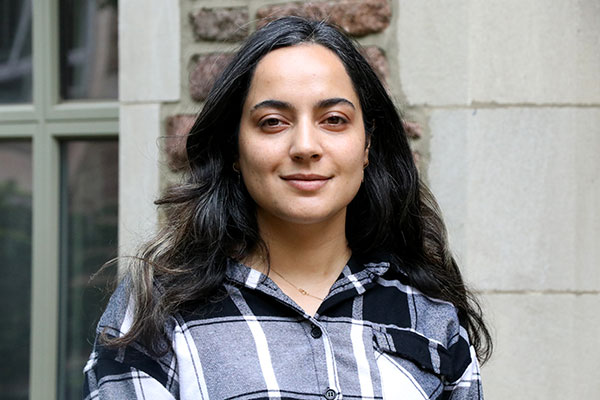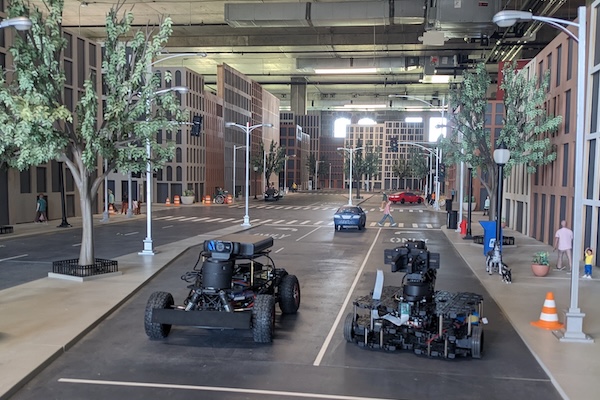It's easy to start your application.
Doctoral Programs
The Preston M. Green Department of Electrical & Systems Engineering provides our students the opportunity to become directly involved in conducting research and finding new solutions to the world's greatest challenges.
Research and university partnerships allow trainees the opportunity to work with renowned faculty and experts in the field as they explore and examine areas such as quantum optics, sensors, data sciences and systems optimization.
Full Support & Funding
Our PhD students are fully funded, including full tuition support and health insurance. As a doctoral candidate, you will also receive a generous stipend to cover living expenses. This support is guaranteed as you continue to make satisfactory progress towards your degree.
PhD in Electrical & Systems Engineering
Andrew Clark, an associate professor and director of PhD recruitment and admissions in the electrical and systems engineering department, discusses the unique aspects of ESE. He is joined by PhD candidates Maxwell Adolphson, BethAnna Jones, Addison Schwamb, and Hongchao Zhang, who emphasize the distinctive perspective on engineering challenges, the collegial environment, and numerous collaboration opportunities across departments and schools.
About our programs
Our department offers both a Doctor of Philosophy (PhD) and Doctor of Science (DSc) degrees in both electrical engineering and systems engineering.
- The PhD program is designed for full-time students interested in pursuing a career in research or academics.
- The DSc is for full or part-time students who wish to pursue an academic career or a career in industry.
Student Profile

"I decided to pursue a graduate degree because it would allow me to take on challenging coursework, engage with like-minded people and take part in cutting-edge research initiatives."
Shirin Shoushtari
Degree pursuing: PhD in electrical engineering
Program Information
Students pursuing the Doctor of Philosophy (PhD) or Doctor of Science (DSc) degrees in Electrical Engineering or Systems Science & Mathematics must complete a minimum of 72 credit hours of post-baccalaureate study consistent with the residency and other applicable requirements of Washington University in St. Louis and the Graduate School. These 72 units must consist of at least 36 units of course work and at least 24 units of research, and may include work done to satisfy the requirements of a master's degree in a related discipline. Up to 24 units for the PhD and 30 units for the DSc may be transferred to Washington University in St. Louis from another institution.
- Complete at least 36 hours of post-baccalaureate course work
- Pass an oral qualifying examination, to be taken before the second academic year of the program
- Pass an oral preliminary research examination, to be completed within two years of passing the qualifying examination, and at least one year prior to completion of the dissertation
- Satisfy the general residency requirement for the Graduate School (PhD) or the McKelvey School of Engineering (DSc)
- Satisfy the general teaching requirement for PhD degrees offered by the Graduate School; no teaching requirement for the DSc
- Write a doctoral dissertation that describes the results of original and creative research in a specialization within electrical engineering or systems science and mathematics
- Pass a final oral examination in defense of the dissertation research
- Take ESE 590 Electrical and Systems Engineering Graduate Seminar each semester
- A baccalaureate degree in engineering or the physical sciences/mathematics. With few exceptions, admitted PhD/DSc students typically have had grade point averages of at least 3.5 out of 4.0, respectively.
- Courses highly recommended:
- Calculus Sequence and Differential Equations
- Probability and Statistics
- Engineering Mathematics
- Matrix Algebra
- Physics *
- Introductory Computer Science
- Signals and Systems
- Circuits/ Electrical Networks
- Additional courses for Prospective Electrical Engineering Students
- Doctoral students seeking financial aid must take the general sections of the Graduate Record Examination. Admitted students typically have an average score greater than 90 percent on the quantitative section (new GRE scale) and 3.5 or greater on the analytical section. International students must also submit TOEFL scores earned within the past two years. Admitted students typically have composite scores of 95 or greater.
- Undergraduate or postgraduate research experience is highly desirable for admission to the PhD program. Letters of recommendation from research mentors are a particularly important part of the graduate application. Descriptions of previous research experience or future research goals in the personal statement portion of the application are also important in the admissions decision.
- Selected qualified students residing in the U.S. may be invited to campus to interview with faculty and other students prior to or after being offered admission.
Research Areas
Our faculty perform innovative research in four distinct areas: applied physics, devices and circuits, signals and imaging, and systems science.




